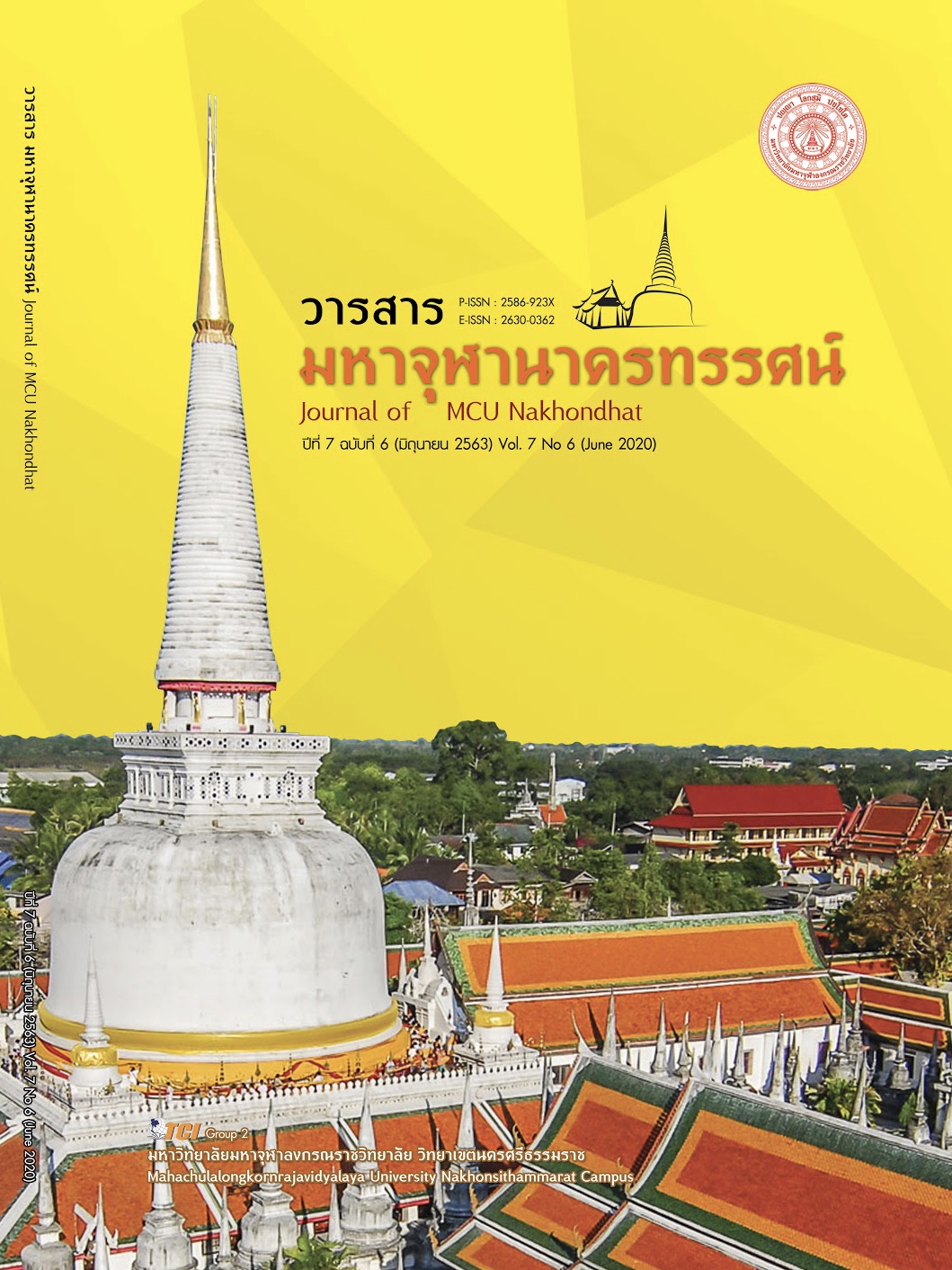THE IMPACT SPREAD OF THE CORONAVIRUS 2019 (COVID – 19) ON OCCUPATION OF A FOOD DELIVERY SERVICE
Main Article Content
Abstract
The purpose of this research is 1) To study about working conditions of food deliverer in the situation of Coronavirus 2019 spreading in Bangkok metropolitan region, and 2) To study about the opinion on the government's measure and deliverer's concern in the situation of Coronavirus 2019 spreading. From the result of the former aspect, it can be seen that the overall working condition in the situation of Coronavirus 2019 spreading is at the medium level. In other words, deliverers can adjust to the situation of Coronavirus 2019 spreading by protecting themselves to restrain the virus spreading. Moreover, most companies also provide protection measures to support such as the provision of space among people and avoiding touch. This causes most food delivery businesses to remain to be continuously operated. In addition, in terms of the aspect of the government's healing measure, deliverers have recognized that the government should provide other healing measures, and distribute more money to support the population. For situation management measures and accessible measures for people, it can be seen that the government is still not capable to manage and make people conveniently access to any government measures. Furthermore, in terms of concern, it can be seen that deliverers mostly concern about the economic situation. It has been observed that Coronavirus 2019 spreading does not only widely impacts on one country but also impacts on every country around the world. Therefore, the solution to tackle this crisis must be co – ordinately implemented by all people around the world to restrain the spreading of Coronavirus 2019.
Article Details
References
ศูนย์วิจัยกสิกรไทย. (2563). ผลของการแพร่ระบาดไวรัสโควิด - 19 ต่อธุรกิจการให้บริการแบบ On - Demand. เรียกใช้เมื่อ 5 พฤษภาคม 2563 จาก https://kasikorn research.com/th/analysis/k-econ/business/Pages/z3099 .aspx
สำนักข่าวไทย. (2563). เปรียบเทียบสถานการณ์ซาร์ส - เมอร์ส - โคโรนา. เรียกใช้เมื่อ 6 พฤษภาคม 2563 จาก https://www.mcot.net/viewtna/5e42b843e3f8e 40af3417637
Scott R. Baker et al. (2020). Covid - induced economic uncertainty .National Bureau of Economic Research. เรียกใช้เมื่อ 6 May 2020 จาก https://www.nber.org/ papers/w26983.pdf
Baldwin, R. & Tomiura, E. (2020). Thinking ahead about the trade impact of COVID - 19. Economics in the Time of COVID - 19, 59.
EIC SCB. (2020). โควิดทำเศรษฐกิจแย่ นักท่องเที่ยวลด ค้าปลีกเจ็บหนัก 5 แสนล้าน. เรียกใช้เมื่อ 6 พฤษภาคม 2563 จาก https://brandinside.asia/eic-scb-assess-covid-impact-retail-and-tourism/
Foodpanda. (2020). Foodpanda, cares. Retrieved May 2020, 2020, from https://www.foodpanda.co.th/th/contents/coronavirus-covid-19?r=1
Grab. (2563). ข้ามผ่านวิกฤตโควิด - 19 ไปด้วยกัน. เรียกใช้เมื่อ 6 พฤษภาคม 2563 จาก https://www.grab.com/th/safety/covid-19/
Kemp, S. (2020). Digital in 2020: global digital overview. Retrieved May 6, 2020, from https://wearesocial.com/blog/2020/04/digital-around-the-world-in-april-2020
Likert, R. (1974). A method of constructing an attitude scale. Scaling: A sourcebook for behavioural scientists. Chicago: Aldine Publishing.
Siu, A. & Wong, Y. R. (2004). Economic impact of SARS: the case of Hong Kong. Asian Economic Papers, 3(1), 62-83.
SME Startup. (2563). คุยกับ 3 พนง.ส่งอาหารเดลิเวอรี่ อาชีพคิวทองยุคโควิด - 19 ขับยังไงให้โกยรายได้งาม. เรียกใช้เมื่อ 6 พฤษภาคม 2563 จาก https://www.sme thailandclub.com/startups-5624-id.html
Van Doremalen et al. (2020). Aerosol and surface stability of SARS-CoV-2 as compared with SARS-CoV-1. New England Journal of Medicine, 382(16), 1564-1567.
world health organization. (2020). Coronavirus in Thailand. Retrieved May 6, 2020, from https://www.who.int/thailand/health-topics/coronavirus
Yamane, Taro. (1967). Statistics: An Introductory Analysis. (2nd Ed.). New York: Harper and Row.


